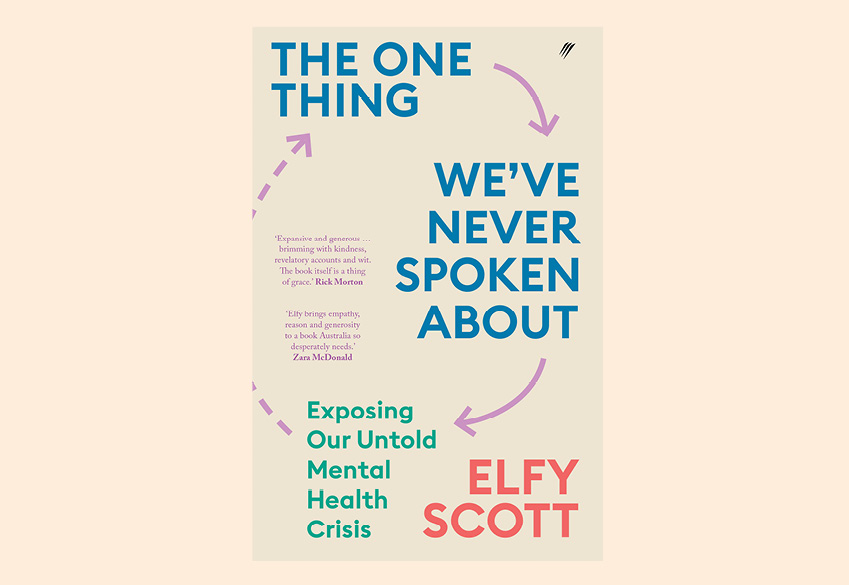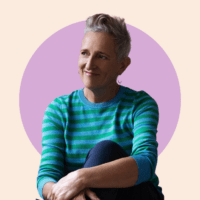In April of 2019, my mum sent a message to our family WhatsApp group. ‘I swear someone has planted an electronic device on me. I’ve been hearing people making conversations.’
In any other family group chat, a message like this would be a horrifying, shattering thing to receive. In ours, it wasn’t that unusual or unexpected. My brother was quick to console Mum with a refrain that’s become familiar to our household over the years: ‘It’s just your voices.’
Mum, however, remained insistent on her initial theory. She asked with patient confusion, ‘But when did they plant it?’
Up to this point, Mum’s schizophrenia – the medical appointments, the prescriptions and the administration of medication – had unfolded largely behind doors closed to my siblings and me.
It was a part of Mum’s life we knew about to a certain extent, but it was treated like an open secret in our household. An aspect of her life that we euphemistically referred to as her ‘voices’, or her ‘illness’, at times when it could not be ignored. The rest of the time, we spoke about it surprisingly little.
“Up to this point, Mum’s schizophrenia had unfolded largely behind doors closed to my siblings and me.”
It wasn’t that we didn’t care about it; schizophrenia was simply an uncomfortably emotional topic, and as we’re a family with a stilted approach to emotional topics at the best of times, it just wasn’t explicitly discussed. My dad grew up in the ’50s in Britain, and my mother is Southeast Asian. For readers who share these cultural backgrounds, this brand of repressed family discourse will likely need no further explanation.
However, in early 2019, when we received that message, it was becoming increasingly apparent that our 64-year-old mother’s condition was deteriorating.
It was decided that one of us should accompany Mum to the next appointment with her psychiatrist and since I lived only 40 minutes’ drive away, that was going to be me. It was in this way that the veil over my mum’s mental health condition finally began to lift for me.
“The veil over my mum’s mental health condition finally began to lift for me.”
Mum is a Muslim, an Indonesian immigrant, a woman who loves to laugh at only the silliest things and who everybody in my social circle describes (quite rightly) as ‘adorable’. She has a tanned complexion, with a bob of silver hair and a broad smile. She’s warm, extremely social and is likely to greet any and all guests with wildly delicious Indonesian meals that are, as Dad likes to say, ‘enough to feed a small nation’.
Mum is also a deeply private person. But when I called her in mid-2021 to ask permission to write about her schizophrenia for my book ‘The One Thing We’ve Never Spoken About’, the conversation was easier than I’d expected.
As it turns out, she was really pleased by the idea and agreed to participate on the basis telling her story could possibly help other people.
One of the first ways that she helped in my research along was to hand me an exercise book, which she had used as a journal to document her memories of psychosis. She’d been encouraged by a psychiatrist to reflect on her memories years after she’d experienced the onset of schizophrenia.
It took me days to work up the courage to even begin reading the journal. Over 10 or so pages, opening with the line ‘How it started’, I found the details of her hallucinations and where they began.
It was during her quietest moments, as she prayed on the mat in her sewing room that adjoined my parents’ bedroom, that she first began to hear voices.
‘Every morning when I pray, I started to hear an elderly woman’s voice abusing me. Saying “Prostitute!”’
‘I continue on praying & as the days progress it builds up. I’m beginning to feel somebody watching me around the house – it’s always ladies’ voice following what I’m doing and commenting.’
Mum was obviously petrified by the appearance of the voice, and she was also plainly hurt by what it had to say. But, however distressed she may have been, she didn’t tell anyone about the hallucinations, not even my dad, for months.
‘Every morning when I pray, I started to hear an elderly woman’s voice abusing me. Saying “Prostitute!”’
In late 1992, Mum fell pregnant with me, and the voices began to dissent; they didn’t want a new baby. Caring for my older siblings Maddy and Mike had been hard enough, and having another child on the way seemed like wholly too much to handle.
Mum considered aborting the pregnancy to silence their protests, but couldn’t face that decision and forged ahead. And so I grew – but then, so did the scale of Mum’s problems.
The voices became clearer, louder and deeply aggressive throughout the pregnancy. Mum began to feel terrorised around the house and she started to hear voices emanating from the depths of our back garden. A male voice began to emerge from these darker, unoccupied corners, belittling her and calling her a ‘whore’. She became so terrified that these supposed people were trying to break in that she called the police, who provided little help, either for the home break-in or the mental health condition that had led her to imagine it.
One night, late in her pregnancy, as she watched television in the downstairs living room, Dad quietly ironing clothes on the other side of the room, the voices came on in a particularly hateful onslaught and Mum was forced to acknowledge out loud for the first time what had been happening to her. She whipped around and asked Dad, ‘Did you hear that?!’ She was panicking. Dad hadn’t heard a thing.
They knew quickly to seek psychiatric care, but in the months that followed, their lives became increasingly chaotic. Mum was diagnosed with schizophrenia and her condition deteriorated markedly after I was born in March of 1993. The psychotic delusions became more florid, and she grew convinced that a nameless, faceless ‘somebody’ was threatening her.
“The voices became clearer, louder and deeply aggressive throughout the pregnancy. Mum began to feel terrorised around the house.”
The years following the onset of Mum’s schizophrenia were immensely stressful for my parents but there are a variety of reasons my mum fared better than many others with the same diagnosis. For a start, she developed the condition as an adult woman, meaning she was statistically less likely to experience more severe symptoms and lower social functioning than, say, a young man who develops the condition.
In addition to this, our family was financially stable enough to afford mum long-term, regular care with psychiatrists, with whom she formed meaningful bonds. She also had a husband who loved and cared for her, and the same friends who attended to Mum back in those darkest days have stuck by her. Mum also believes that she had a strong source of personal motivation to manage her condition – and that was us, her children.
‘No matter what, I would not fail as a parent,” she wrote.
Considering what Mum was going through, it may seem bewildering for me to say this but … our childhood was really fairly average and happy. We did all the average and happy kid things that most average and happy families did.
My wonderful dad would drive us to the local pool on Saturdays and we’d splash around in the lanes, just enough for it to be considered exercise so we could reap icy pole rewards. We all went to Maddy’s netball games, Mike’s swimming and athletics. We watched Blackadder and played Monopoly.
This is not to say that Mum’s mental health condition didn’t affect the household at all; in fact, one of the most profound ways that Mum’s schizophrenia has made its mark on our lives is through the silence that shrouded it in those early years.
Her condition didn’t feel shameful to speak about so much as it just felt quite scary and dark – too jarring to make sense in our day-to-day lives outside of the house and too big to concern other people with. And, so, it became a secret.
My brother and sister report the same today: how strange it was that we all knew in some way but could never speak about it. I also didn’t feel any amount of confidence divulging this secret to friends until I was 17 [CHK] and, even when I did, there was a distinct lack of comprehension of what I was saying.
What I didn’t fully comprehend for the longest time was that the silence was much more awful for Mum than it was for me and my siblings. I didn’t grasp this fully until she handed me her journal: how much she bore the weight of the secrets she kept from us as well.
“Considering what Mum was going through, it may seem bewildering for me to say this but … our childhood was really fairly average and happy.”
In 2021, I wrote a column for the Guardian to coincide with Schizophrenia Awareness Week. It was the first time that I had spoken publicly about what my family had experienced and what Mum lives with, and now I have written a book ‘The One Thing We’ve Never Spoken About’ about Mum’s condition and the failings of Australia’s mental healthcare system.
Sharing the secret was a terrifying prospect, but I knew I had to write about it.
The silence around schizophrenia was more than a personal discomfort; it extended far beyond our home and my social group, it was there in public dialogue, too. Silence about schizophrenia means that even some of the most progressive journalists I know can make jokes on Twitter about being ‘mental’, ‘insane’, hearing voices or ‘going psychotic’ and never be chastised for it.
It means that when we walk past someone who is clearly suffering from psychosis in the street, we don’t meet their gaze or even acknowledge their suffering. It means that no one with a heavy heart whose life is made miserable by their experiences with complex mental health conditions, or by frustrations with the mental healthcare system, can ever truly speak up about what they’re going through.

This silence shows its face in horrifying depictions of complex mental health conditions in newspaper headlines and on screens. It keeps the loved ones of people living with these conditions in the dark, and clawing for air, as they cope with all of the complications of life in caring for struggling people. It means that housing crises are never addressed and prisons are allowed to fill to the brim with people who need psychiatric attention.
Stigma and silence are the reasons that we permit suffering for people living with schizophrenia and other mental health conditions. They’re also the reasons we don’t even have to acknowledge what’s happening. Stories of distress, discrimination and hardship don’t matter if they’re not ever written down to begin with.
But I have faith that within these collective voices and stories lies the power to break the cycle and help make other people’s lives better. After all, that’s what my mum wanted for this project, and I don’t like to let her down.
Edited extract from The One Thing We’ve Never Spoken About (Pantera Press) by Elfy Scott, RRP $32.99, on sale now.
Want more stories like this from PRIMER? Sign up to our free weekly newsletter









No Comments